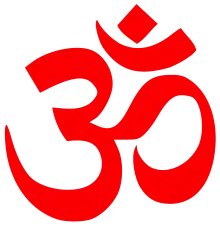Malkauns
Malkauns is a raga in Indian classical music. It is one of the oldest ragas of Indian classical music.[1] The equivalent raga in Carnatic music is called Hindolam, not to be confused with the Hindustani Hindol.
 | |
| Thaat | Bhairavi |
|---|---|
| Type | Audava |
| Time of day | Late night, 12–3 |
| Arohana | .ni. Sa ga Ma dha ni *Sa* |
| Avarohana |
|
| Synonym |
|
| Equivalent | Hindolam |
| Hindustani classical music | ||||||
|---|---|---|---|---|---|---|
| Concepts | ||||||
| Instruments | ||||||
|
||||||
| Genres | ||||||
|
||||||
| Thaats | ||||||
| Part of a series on |
| Hindu scriptures and texts |
|---|
 |
| Related Hindu texts |
Etymology
The name Malkaush is derived from the combination of Mal and Kaushik, which means he who wears serpents like garlands — the god Shiva. However, the Malav-Kaushik mentioned in classical texts does not appear to be the same as the Malkauns performed today.[2] The raga is believed to have been created by goddess Saraswati to calm Shiva, when the lord Shiva was outraged and was not calming down after Tandav in rage of Sati's sacrifice.
Malkaush belongs to Shaivait musical school; in fact most pentatonic ragas belong to Shaivait musical school.[1]
Shiv ttva ratnakara, 6, 8, 67[1]
Arohana and Avarohana
Malkauns belongs to the Bhairavi thaat. Its notes are Sa, komal Ga, shuddh Ma, komal Dha, and komal Ni. In Western classical notation, its notes can be denoted as: tonic, minor third, perfect fourth, minor sixth and minor seventh. In raga Malkauns, Rishabh (Re - second) and Pancham (Pa - perfect fifth) are completely omitted. Its jaati is audav-audav (five-five, that is, pentatonic).
Arohana : .ni. Sa ga Ma dha ni *Sa*
Avarohana : *Sa* ni dha Ma ga Ma ga Sa OR *Sa* ni dha Ma ga Sa
The 'Ga' used is actually Ga-Sadharan (the rough minor third), 316 cent above Sa[3]
Pakad or Chalan
Pakad : ga ma dha ma ga ma ga sa
Other Characteristics

Malkauns is a serious, meditative raga, and is developed mostly in the lower octave (mandra saptak) and in a slow tempo (vilambit laya). Ornaments such as meend, gamak and andolan are used rather than 'lighter' ornaments such as murki and khatka. Komal Ni is generally considered the starting note (graha swara), and the notes komal Ga and komal Dha are performed with vibrato (andolit). All five swaras can function as pausing notes.
The komal Ni in Malkauns is different from the komal Ni in Bhimpalasi.
The best time for this raga is late night. The effect of the raga is soothing and intoxicating.
Related Ragas
Some related ragas are Chandrakauns, Nandkauns, Sampoorna Malkauns, Pancham Malkauns, Kausi Kanada, Madhukauns, Jogkauns and Tulsikauns.
Film Songs
'Man Tarpat Hari Darshan Ko Aaj' (film Baiju Bawra, performed by Mohammad Rafi), 'Aadha Hai Chandrama Raat Aadhi' (film Navrang, performed by Mahendra Kapoor and Asha Bhosle), 'Chham Chham Ghunghroo Bole' (film Kaajal, performed by Asha Bhosle), 'Ankhiyan Sang Ankhiyaan Laagi Aaj' (film Bada Aadmi), 'Balma Maane Na' (film Opera House) and 'Rang raliyaan karat sautan sang' (film Birbal My Brother), 'Gori tera gaon bada pyara' (film Chitchor, performed by K.J. Yesudas), 'Ek Ladki Thi' (film Love You Hamesha, performed by Kavita Krishnamurthy), 'Chalo Tumko Lekar Chale' (film Jism, performed by Shreya Ghoshal), are a few Hindi film compositions based on Malkauns. 'Rajasekhara' in the film 'Anarkali' in Tamil and Telugu is a composition based on this in South India. "Ohm Namashivaya" and "Margazhi Poove" songs in Tamil by Illayaraja and AR Rahman from Salangai Oli and May Madham respectively,""Neenu Neene" song from the movie Gadibidi Ganda, "Ra Ra" song in the movie Apthamitra in Kannada are also the best examples.
Language:Tamil
Important Recordings
- Amir Khan, Ragas Hansadhwani and Malkauns, HMV LP (long-playing record), EMI-EASD1357
Mekaal Hasan Band's Maalkauns from the album Andholan is also based on this.
References
External links
Literature
- Gosvami, O. (1957), The Story Of Indian Music, Bombay: Asia Publishing House